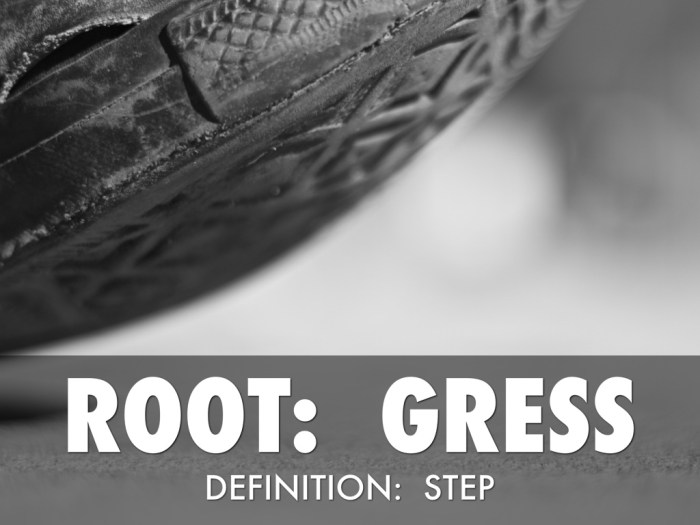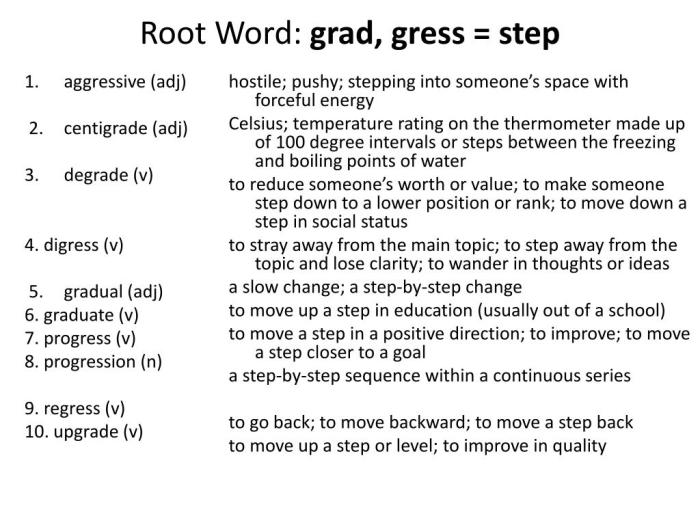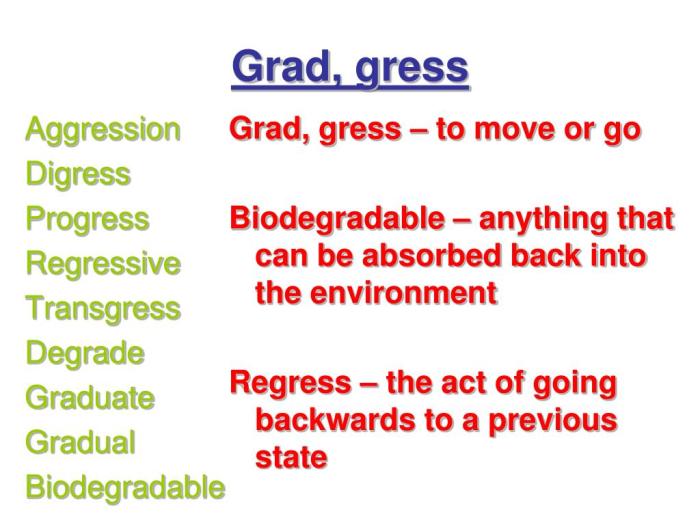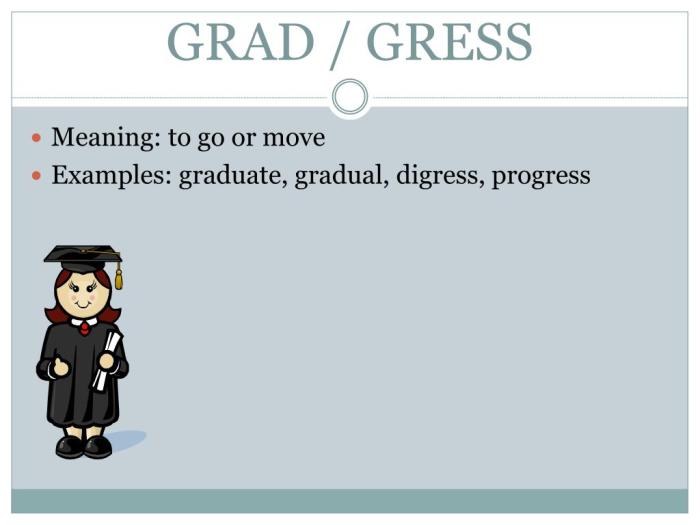Words with the root gress – Words with the root ‘gress’ form an intricate tapestry within the English language, inviting us to explore their etymological origins, semantic nuances, and grammatical patterns. From the Latin ‘gressus,’ meaning ‘to step,’ these words paint a vibrant picture of movement, progress, and aggression.
Delving into their etymology, we uncover the historical evolution of these words, tracing their journey from ancient Latin to their modern-day usage. Their semantic range extends across diverse fields, from physical movement to abstract concepts of advancement and hostility.
Etymology of Words with the Root ‘gress’

The Latin root ‘gress’ signifies ‘to step’ or ‘to go.’ This root has left an indelible mark on the English language, contributing to the development of numerous words related to movement and progression.
One of the most common English words derived from ‘gress’ is ‘progress,’ which literally means ‘to move forward.’ Other examples include ‘gress’ itself, meaning ‘to walk,’ ‘egression’ (the act of going out), and ‘congress’ (a gathering of people).
Historical Evolution
The root ‘gress’ has undergone subtle changes in its usage over time. In its original Latin form, it primarily referred to physical movement. However, as the English language evolved, ‘gress’ and its derivatives took on broader meanings, encompassing both physical and metaphorical progression.
For instance, ‘progress’ came to denote not only physical advancement but also intellectual and social development. Similarly, ‘congress’ expanded from its initial meaning of a gathering of people to include legislative assemblies and international organizations.
Semantic Range of ‘gress’-Derived Words

The root ‘gress’ exhibits a wide semantic range, encompassing concepts related to movement, progress, and aggression. This diversity is reflected in the varied meanings conveyed by its derivatives.
Words with the root ‘gress’ can be broadly categorized into three main semantic fields:
Movement
- gress(Latin): to step or walk
- progress(Latin): to move forward
- regress(Latin): to move backward
- transgress(Latin): to go beyond a boundary
Progress
- progress(Latin): advancement or improvement
- aggressive(Latin): tending to attack or confront
- regress(Latin): decline or deterioration
Aggression
- aggression(Latin): hostile or violent behavior
- ingress(Latin): an entrance or point of entry
- egress(Latin): an exit or point of departure
The semantic range of ‘gress’-derived words has expanded over time. For instance, “progress” initially meant “to move forward” but now also refers to “advancement or improvement.” Similarly, “aggression” originally denoted “tending to attack or confront” but has broadened to include more general forms of hostility or violence.
Morphological Analysis of ‘gress’ Derivatives

The root ‘gress’ undergoes various morphological changes when combined with affixes and suffixes, leading to the formation of new words with distinct meanings and parts of speech.
Affixes and Suffixes, Words with the root gress
- Prefixes: a-, ad-, con-, e-, g-, in-, pro-, re-, trans-
- Suffixes: -able,-ion, -ioner, -ive, -or, -ure
Modification of Meaning and Part of Speech
Affixes and suffixes modify the meaning and part of speech of ‘gress’-derived words in the following ways:
- Prefixes:Alter the meaning by adding specific nuances or changing the direction of the action.
- Suffixes:Change the part of speech, typically transforming ‘gress’ into nouns, adjectives, or verbs.
Morphological Structure of ‘gress’ Derivatives
| Word | Affix/Suffix | Meaning | Part of Speech |
|---|---|---|---|
| aggress | a- (prefix) | to move towards | Verb |
| congress | con- (prefix) | to move together | Noun |
| egress | e- (prefix) | to move out | Noun |
| progression | -ion (suffix) | the act of moving forward | Noun |
| aggressive | -ive (suffix) | tending to move forward | Adjective |
Syntactic Patterns of ‘gress’ Derivatives

The syntactic roles played by ‘gress’-derived words in sentences vary depending on the part of speech they belong to.
Words with the root gress, such as progress and aggression, have Latin origins and often convey ideas of movement or change. For a fun twist, check out da de di do du palabras to explore a playful language game. Returning to words with the root gress, they continue to enrich our vocabulary with their nuanced meanings, adding depth and precision to our expression.
Nouns derived from ‘gress’ often function as the subject or object of a sentence, indicating a person or thing that progresses or advances. Adjectives derived from ‘gress’ typically modify nouns, describing their progressive or advanced nature. Verbs derived from ‘gress’ express actions or states related to progression or advancement, and can be used in various grammatical constructions.
Subject and Object
- The progressof the project was remarkable.
- The company’s aggressivemarketing strategy led to increased sales.
Adjectives Modifying Nouns
- The progressivestudent made rapid academic progress.
- The company’s aggressiveexpansion plans included opening new branches in several cities.
Verbs in Various Constructions
- The company progressedsteadily towards its goals.
- The team aggressivelypursued the project, overcoming challenges along the way.
- The organization regressedslightly due to unforeseen circumstances.
Lexical Relationships of ‘gress’ Derivatives: Words With The Root Gress

Words with the root ‘gress’ have various lexical relationships with other words in the English lexicon. They share semantic connections, forming a network of related terms.
One notable relationship is synonymy. ‘Progress’ and ‘advancement’ are synonymous, both referring to the act of moving forward or improving.
Antonyms
Antonyms, words with opposite meanings, also exist. ‘Regress’ is the antonym of ‘progress,’ denoting a backward movement or decline.
Related Terms
Beyond synonyms and antonyms, ‘gress’-derived words have other related terms. ‘Aggressive’ and ‘egression’ share a connection to the idea of movement or action, albeit in different contexts.
The table below illustrates the lexical network surrounding ‘gress’ derivatives:
| Word | Relationship |
|---|---|
| Progress | Synonym: Advancement |
| Regress | Antonym: Progress |
| Aggressive | Related Term: Movement, Action |
| Egression | Related Term: Movement, Action |
Essential Questionnaire
What is the origin of the root ‘gress’?
The root ‘gress’ originates from the Latin word ‘gressus,’ meaning ‘to step.’
How has the meaning of ‘gress’-derived words evolved over time?
The semantic range of ‘gress’-derived words has expanded from its original focus on physical movement to encompass abstract concepts such as progress, aggression, and even mental states.
What are some common affixes attached to ‘gress’ derivatives?
Common affixes include prefixes such as ‘con-‘ (together), ‘trans-‘ (across), and ‘pro-‘ (forward), as well as suffixes such as ‘-ion’ (action or process) and ‘-ive’ (tending to).